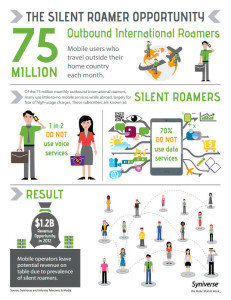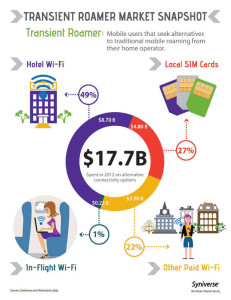I’ve just returned from London where I attended the Informa Mobile Roaming World Summit, it was a great conference, well represented across the industry. One of the recurring discussion points was the huge opportunity in roaming, with lost revenue from customers switching off their phones abroad. I gave a presentation on ‘giving customers control over their data’, and truly believe that this is the way to tackle the roaming dilemma, and addressing this opportunity.
 Synoverse published some statistics earlier this year revealing that 70% of people turn OFF data roaming when abroad. This figure is used quite widely, but at this conference, a number of carriers talked about numbers even more shocking that this, I heard one carrier talking about 97% of customers turning of data roaming, while another shared that just 1% of their customers account for 80% or roaming revenue.
Synoverse published some statistics earlier this year revealing that 70% of people turn OFF data roaming when abroad. This figure is used quite widely, but at this conference, a number of carriers talked about numbers even more shocking that this, I heard one carrier talking about 97% of customers turning of data roaming, while another shared that just 1% of their customers account for 80% or roaming revenue.
It’s not that people don’t want to be connected. They do. And it’s not that they don’t want to spend money. They will. In fact $17.7B was spent in 2012 by proactive consumers, wanted to stay connected, and willing to pay for it, but bypassing their home carrier roaming, and instead purchasing paid WiFi or Local SIM cards. A lot more effort, but these provide the control over spending that customers want.
I like to say that international travelers aren’t price sensitive, they’re price sensible. They want to stay connected, are willing to spend money, but they don’t want to return to a phone bill significantly higher than what they would have chosen to pay, had they had the information at the time. It’s this fear of the unknown, and a perceived inability to control their spend that has led to the majority of people switching off, and seeking out either free WiFi or paid alternatives.
 Roaming prices are not just expensive, they’re outrageous. And without real-time balance, or simple/transparent pricing, it means that people don’t know how much they are spending, or what things will cost. And it’s this lack of control that’s leading people to switch of data, and find an alternative connectivity solution.
Roaming prices are not just expensive, they’re outrageous. And without real-time balance, or simple/transparent pricing, it means that people don’t know how much they are spending, or what things will cost. And it’s this lack of control that’s leading people to switch of data, and find an alternative connectivity solution.
What’s the answer? It’s pretty simple. Give people a way to control how much they spend. We delivered this at DOODAD through simple, transparent pricing, displaying real time balance, and allowing customers to ration data via a Daily Max feature.
I don’t think it will be too far in the future that data globally will be affordably unlimited, and we won’t have to worry about what a MB is, or how to curb our usage. But until then, we need the industry to provide us with the tools to give us the ability to choose how to spend our money, so that we can choose to stay connected.
The above was a guest post written by Sarah Neill, co-founder and former CEO of DOODAD.

